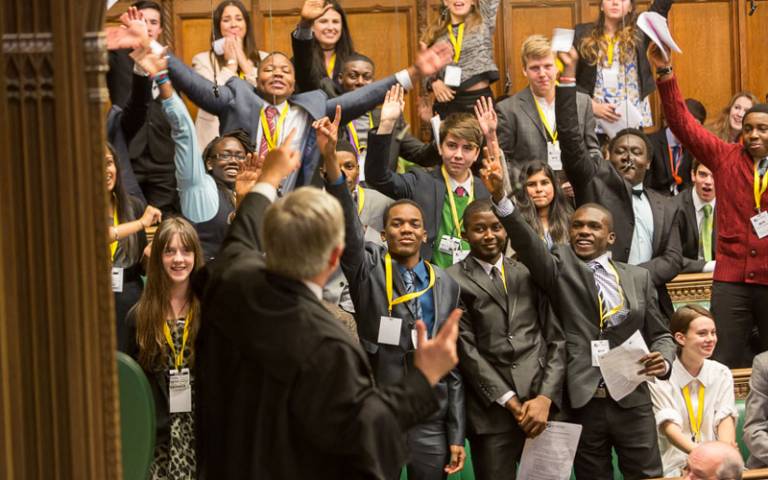Make democratic events compulsory at school to improve political engagement, research concludes
15 November 2018
All secondary school pupils should be required to take part in political activities such as debates, student councils and mock elections to counteract political disengagement from disadvantaged communities, a UCL Institute of Education (IOE) conference will hear today.

These form recommendations of a paper, being presented today, which analysed the varying levels of engagement with politics of young people based on the backgrounds of their parents. It also suggests citizenship classes should be made compulsory for all young people up to the age of 18.
It found that while compulsory citizenship classes, which since 2002 have been part of the national curriculum, are helping to even out socio-economic differences in political engagement, voluntary political activities within school widen them, as children from better-off families are more likely to take them up.
The research, by Bryony Hoskins of the University of Roehampton and the IOE’s Jan Germen Janmaat, was being presented at a major conference being held by the IOE-based LLAKES Research Centre (Centre for Learning and Life Chances in Knowledge Economies and Societies) today and tomorrow.
Professor Hoskins’ analysis highlights a recent decline in voter turnout of people from lower socioeconomic class in UK general elections, which has been greater among young people from these lower socio-economic groups. The study sought to investigate what effect various activities at school might have on this.
It analysed the responses of 6,155 young people, who had been asked about their involvement with activities in school which could support them becoming engaged with the political process.
Access to citizenship education lessons, participation in voluntary “political activities” such as school councils and debates, and whether lessons supported an “open climate” for political discussion were analysed according to the social-economic backgrounds of the young people answering the questions.
The analysis found that there were no significant differences in access to citizenship education by background.
However, both the voluntary “political activities” and “classroom climate” categories were significantly related to pupil backgrounds, with those from more disadvantaged homes being less likely to participate in the former, and less likely to report an open climate for debate under the latter heading.
“Disadvantaged youth…have significantly less access to these highly important ways of learning political engagement compared to their more advantaged peers,” concluded the study.
It noted “participating in debates or student councils may be a choice and be influenced by an individual’s existing levels of political efficacy, political skills and interest. These qualities could already be higher amongst students from more privileged social backgrounds.”
There is, says the study, therefore “clearly a case for making political activities at school compulsory for all students, across all classes and all schools”.
The study also found that citizenship education, accessed by pupils from all backgrounds, was “particularly effective in enhancing the political engagement levels of those from lower social background in England at age 15-16.”
The study therefore recommends making citizenship education compulsory to the age of 18, now that all young people have to be in some form of education or training to this age.
Media contact
Warwick Mansell
+44 (0) 7813 204245
warwickmansell@gmail.com
Links
- View Dr Jan Germen Janmaat's research profile
- Centre for Learning and Life Chances in Knowledge Economies and Societies (LLAKES)
- Department of Education, Practice and Society
- LLAKES Centre Conference 2018
Image credit
- UK Youth Parliament, 15 November 2013 by UK Parliament via Flickr (CC BY-NC 2.0)
 Close
Close

